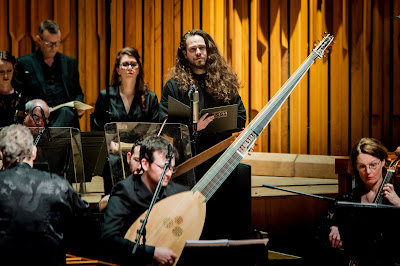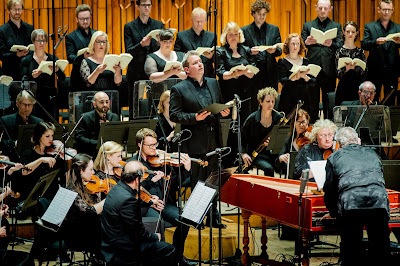 |
| Handel: Brockes Passion - Cody Quattlebaum, Academy of Ancient Music, Richard Egarr Barbican (Photo Robert Workman) |
Reviewed by Robert Hugill on 19 April 2019
Star rating: (★★★★★)
A Handel rarity rediscovered in a richly evocative performance
Handel's Brockes Passion remains relatively unknown in his output despite being a large scale work dating from his prime. The Academy of Ancient Music dusted the piece off at the Barbican Hall on Good Friday (19 April 2019) in a strong performance directed by Richard Egarr, with soloists Robert Murray (Evangelist), Cody Quattlebaum (Jesus), Elizabeth Watts (Daughter of Zion), Ruby Hughes (Faithful Soul), Rachael Lloyd, Tim Mead (Judas), Gwilym Bowen (Peter), Nicky Spence (Faithful Soul) and Morgan Pearse. And there wasn't just a performance, the ensemble has sponsored a new critical edition of the work by Leo Duarte, who was playing first oboe in the performance [see my interview with Leo talking about his love of libraries and old manuscripts].
 |
| Handel: Brockes Passion - Elizabeth Watts, Academy of Ancient Music Barbican (Photo Robert Workman) |
Duarte's new edition makes significant changes to the version of the work known (via the last critical edition in the mid-1960s) including adding 63 extra bars! The Academy of Ancient Music used quite a large ensemble for the piece, and the programme included a fascinating article about the logistical differences between the Hamburg performances and the sort of ensembles Handel was writing for in London at the period, and the one-to-a-part type ethos of Bach in Leipzig. So we have four oboes (lovely) and two bassoons in addition to a significant body of strings (17) and a choir of 20.
 |
| Handel: Brockes Passion - Robert Murray, Academy of Ancient Music, Richard Egarr - Barbican (Photo Robert Workman) |
The role of the Daughter of Zion and the Faithful Soul was to comment, to apply the story to our situation and the express feelings about the Crucifixion narrative. It is from these arias that Bach selected his Brockes settings which he used for the arias in his own Passions, but Bach's balance between aria comment and Biblical narrative is completely different to Brockes's own (rather surprisingly Handel set Brockes text in full, without making any changes). In part two, the solo roles drop away and even Jesus falls silent (his last words being delivered as reported speech by the Evangelist!), and instead we have a long meditation from the Daughter of Zion and the Faithful Souls. It turns the work from one of pure narrative into being about our reaction to it.
Listening to Handel's Brockes Passion is a strange experience, because a lot of the music is familiar or half familiar from other contexts. There is a lot of strong and imaginative music in the piece, but it is also very long and frankly, despite Elizabeth Watts considerable talents there were moments when I looked at the libretto and thought, Oh no! another aria for the Daughter of Zion. It is important that performances like this one be given uncut, so that we can experience the work in full but I imagine that if the work is to become a more regular visitor to the concert hall then it will need trimming and re-shaping.
 |
| Handel: Brockes Passion - Ruby Hughes, Academy of Ancient Music, Richard Egarr - Barbican (Photo Robert Workman) |
The Academy of Ancient Music performance was strongly cast, perhaps too strongly and artists like Nicky Spence and Rachael Lloyd seemed woefully underused. The roles of James (Cathy Bell) and John (Kate Symonds-Joy) were step-out roles from the choir and it would seem that that might be the way forward for this work.
Elizabeth Watts made a strong case for the Daughter of Zion, though arias were preponderantly lamenting. Her two final arias in Part One were wonderful, and both paired her with Leo Duarte's solo oboe to powerful and consoling effect. And then in Part Two she had a striking duet with Jesus, one of a number of places where the Daughter of Zion's rhetorical questioning inserted itself into the narrative, so she had a powerfully dramatic arioso when Jesus refuses to answer Caiaphas (Morgan Pearse) and another aria begging Pilate (Morgan Pearse again) not to give up. And it is the Daughter of Zion who has the last aria, a striking piece with long passages for voice and oboe with no orchestral support.
 |
| Handel: Brockes Passion - Gwilym Bowen, Academy of Ancient Music, Richard Egarr - Barbican (Photo Robert Workman) |
Ruby Hughes was barely used in Part One, but in Part Two her Faithful Soul took on part of the role in reacting to the narrative, with Hughes giving a performance which powerfully identified with the character's reactions. Her arias were often lyrical (in contrast to the powerful language), and I was particularly struck by 'Den Himmel gleicht' with its huge solo violin part (Bojan Cicic), though sometimes arias were reduced to just Hughes' plangent voice and continuo. Her final contribution was a striking accompagnato where the music really did react to the drama of the words.
Placed in the middle of the orchestra, Robert Murray's Evangelist could have easily have been lost in the welter of sounds and other people's solos, but Murray brought a strong dramatic sense to even the smallest utterance and his performance was highly compelling. Rather more demonstrative than he might be in Bach, but in the context of this work it worked here. Cody Quattlebaum as Jesus was similarly placed in the centre of the orchestra, and there were moments when I would have liked a more forward placing. Quattlebaum's finely lyrical and inward account of this very human Jesus (his contributions to Part Two being reduced to a minimum) might have benefited from greater exposure.
 |
| Handel: Brockes Passion - Nicky Spence, Academy of Ancient Music, Richard Egarr - Barbican (Photo Robert Workman) |
Nicky Spence brought great rhetorical strength to his role as the Faithful Soul, particularly in his first aria where he seemed to be directly challenging the audience. Spence's performance was particularly impressive being as earlier on in the week he performed excerpts from Wagner's Parsifal with the Halle and Sir Mark Elder at York Minster, and it did strike me that someone ought to snap him up quick to play Handel's Samson or Jephtha.
Morgan Pearse gave a series of strong character sketches as Caiaphas, Pilate and the Centurion. Rachael Lloyd was rather underused but had a strong moment as Mary with a dramatic recitative and a touching duet with Quattlebaum's Jesus.
For those used to Handel's choral writing in his oratorios, his use of chorus in the Brockes Passion is relatively brisk. There are chorales which are quite efficient and vigorous choruses for the crowds, but there are no large scale choruses of a style we might be familiar with either from Bach's passions or Handel's oratorios.
It was lovely to hear the work performed with such a relatively substantial ensemble including the four oboes and two bassoons, and so we had a wonderfully rich orchestral palate, along with fine solo playing from Bojan Cicic and Leo Duarte.
This was a long event, some three hours including the interval, and there were a couple of moments when the complexity of a large and unfamiliar work seemed to tell on the musicians. But this was a terrific achievement, the rediscovery both of the urtext Brockes Passion and the demonstration that it is such an unfairly neglected part of Handel's output.
Elsewhere on this blog:
- Education is key: I chat to conductor Nicholas Chalmers about Nevill Holt Opera & its new theatre - interview
- Commemoration & celebration: Sir James MacMillan conducts the BBC Singers at the St John's Smith Square Holy Week Festival (★★★★½) - concert review
- The topsyturvydom effervesced: HMS Pinafore from Charles Court Opera (★★★½) - opera review
- A very human St John Passion: Solomon's Knot in Bach without conductor and from memory (★★★★★) - concert review
- Piano day: two venues, three pianists, two pianos - Sunday morning at Wigmore Hall and Sunday evening at Conway Hall - concert review
- Barrie Kosky’s imaginative production of Leonard Bernstein’s West Side Story returns to the Komische Oper, Berlin - music theatre review
- Small-scale delights at the edge of Handel’s London: Chandos Anthems & Trio Sonatas at St Lawrence Whitchurch (★★★½) - concert review
- The stars shine in Verdi's La forza del destino at Covent Garden despite a rather disappointing production (★★★½) - opera review
- 'Costly Canaries': Mr Handel's Search for Super-Stars at the London Handel Festival (★★★½) - concert review
- In search of Youkali: the life & songs of Kurt Weill at Pizza Express Live - concert review
- Opera speaks to everyone: I chat to soprano Alison Buchanan about Pegasus Opera & their new double bill Shaw goes Wilde - interview
- A musical encounter between two traditions: classical guitarist Christoph Denoth's exploration of tango - Tanguero: Music from South America (★★★★) - CD review
- Barrie Kosky’s production of Leonard Bernstein’s Candide at Komische Opera, Berlin
(★★★★) - musical theatre review - Home











No comments:
Post a Comment